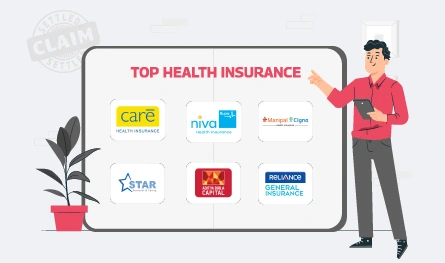Related Articles
 Jan 08, 2025
Jan 08, 2025
Is Varicose Vein surgery covered under the health insurance policy in India
 Health Insurance
Health Insurance

Until recently health insurance has been overlooked by many as not a very significant requirement of life. Although the life insurance of the breadwinner has always been an area of prime importance for many families, the health insurance of the entire family has been neglected. However, things are changing, especially after COVID-19, and family health plans are getting prominence. Moreover, the high cost of medical treatments and the rising number of lethal diseases are other reasons for prioritizing health insurance. In this post, we are discussing the top 10 health insurance companies in India in terms of their claim settlement ratio (CSR).

The Claim Settlement Ratio or CSR in health insurance refers to the ratio between the number of claims settled and the total number of claims received by an insurance company in a financial year. Claim Settlement Ratio is calculated with the help of the following formula = (total claims settled / total claims filed) multiplied by 100. The CSR helps to determine if a health insurance company is capable of settling the claims of the customers.
The health insurance claim settlement ratio is important because it offers details about the ability of the insurer to pay claims. It serves as an efficient measurement for comparing health insurance companies. It keeps a tab on the insurer's claim settlement position and their reliability.
It is essential to compare health insurance companies in terms of their claim settlement ratio (CSR) when purchasing health insurance plans to ensure the settlement of your claims. A health insurance claim settlement ratio of 85% or more is considered good for a health insurance company.
| Serial No. | Company | Claim Settlement Ratio (CSR) FY - 2022-23 | Incurred Claim Ratio (ICR) FY – 2022-23 |
| 1 | Care Health Insurance Ltd. | 100% | 53.82% |
| 2 | Niva Bupa Health Insurance Co. Ltd. | 100% | 54.05% |
| 3 | ManipalCigna Health Insurance Co. Ltd. | 99.96% | 64.66% |
| 4 | Star Health and Allied Insurance Co.Ltd. | 99.21% | 65% |
| 5 | Aditya Birla Health Insurance Co. Ltd | 99.01% | 64.68% |
| 6 | Reliance General Insurance Co. Ltd. | 98.75% | NA |
| 7 | HDFC ERGO General Insurance Co. Ltd. | 98.59% | 79.04% |
| 8 | Zuno General Insurance Ltd. | 98.54% | 89.59% |
| 9 | ICICI Lombard General Insurance Co. Ltd. | 98.53% | 77.33% |
| 10 | Acko General Insurance Ltd. | 97.68% | 83.88% |
| 11 | Kotak Mahindra General Insurance Co. Ltd. | 97.61% | 56.01% |
| 12 | Liberty General Insurance Ltd. | 97.46% | 74.17% |
| 13 | Raheja QBE General Insurance Co. Ltd. | 97.30% | 138.67% |
| 14 | Go Digit General Insurance Ltd. | 96.83% | 71.87% |
| 15 | SBI General Insurance Co. Ltd. | 96.47% | 73.92% |
Note: Please note that the Claim Settlement Ratio is not published by the IRDAI in its annual report. Instead, they publish the Incurred Claim Ratio details and the claim settlement tenure.
Health insurance claims can be settled in two different ways - the cashless claim process and the reimbursement claim process:
The health insurance claim form for cashless claims can be filled in case the policyholder avails the treatment at a network hospital of the health insurance company. Here are the steps to follow:
If policyholders get medical treatment at a hospital of their choice which is not a part of the network hospitals of the insurance company, they can get the claim amount reimbursed by filing a reimbursement claim. Here, the policyholder has to pay the treatment cost out of his pocket at the time of discharge. Later, he can submit the claim to the health insurance company for reimbursement. Below are the steps:
Health insurance claim status can be checked online by following the below steps:
A claim settlement ratio of 80% and above is considered a good claim settlement ratio in health insurance.
Claim Settlement Ratio is calculated with the help of the following formula: (total claims settled / total claims filed) multiplied by 100
The Insurance Regulatory and Development Authority (IRDAI) offers the details of CSR. They publish annual reports every year with information on the Claim Settlement Ratio of all the Health insurance companies selling plans in India.
As per IRDAI, health insurance companies must settle health insurance claims within 30 days of receiving the claim.
There are 25 general health insurance companies available in India.

Paybima Team
Paybima is an Indian insurance aggregator on a mission to make insurance simple for people. Paybima is the Digital arm of the already established and trusted Mahindra Insurance Brokers Ltd., a reputed name in the insurance broking industry with 17 years of experience. Paybima promises you the easy-to-access online platform to buy insurance policies, and also extend their unrelented assistance with all your policy related queries and services.
In a country where medical inflation is rising rapidly, securing a comprehensive health coverage plan for the entire family is no longer optional, it is essential. Selecting the right health insurance requires careful evaluation of multiple factors, not just premium costs. A well-chosen plan ensures financial security, access to quality healthcare, and peace of mind during medical emergencies.


Term insurance is an important investment. However, with the availability of so many insurers offering term plans, it becomes difficult to select the best term plan to suit your needs. Buying a term plan needs some consideration and research on the part of the policyholder. In this post, let us discuss the best term insurance providers in India.


Have you ever caught yourself lost in illusions about your daughter's future events, such as her university convocation and first day at work? Her university convocation. When she embarks upon her initial job after graduation will be the day.

.png)
When you sign up for a life insurance policy - whether it’s a traditional term insurance policy or a ULIP – you are not just buying peace of mind. You are also trusting the insurer with your money. So naturally, you would want to know: How is that money being managed? And more importantly, how is it being protected from risky decisions?

.png)
Globally, 20th October marks the day to observe World Osteoporosis Day. Do you know the significance of observing Osteoporosis on a global platform? Do you know how this condition affects people and their lives? Let us find out in this post!
